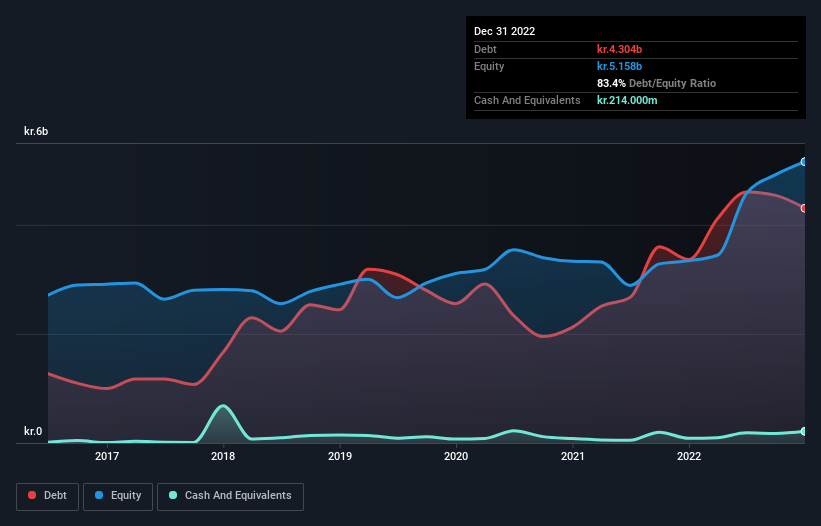Here's Why Royal Unibrew (CPH:RBREW) Can Manage Its Debt Responsibly
Legendary fund manager Li Lu (who Charlie Munger backed) once said, 'The biggest investment risk is not the volatility of prices, but whether you will suffer a permanent loss of capital.' When we think about how risky a company is, we always like to look at its use of debt, since debt overload can lead to ruin. We note that Royal Unibrew A/S (CPH:RBREW) does have debt on its balance sheet. But is this debt a concern to shareholders?
When Is Debt Dangerous?
Debt assists a business until the business has trouble paying it off, either with new capital or with free cash flow. Ultimately, if the company can't fulfill its legal obligations to repay debt, shareholders could walk away with nothing. While that is not too common, we often do see indebted companies permanently diluting shareholders because lenders force them to raise capital at a distressed price. Having said that, the most common situation is where a company manages its debt reasonably well - and to its own advantage. The first step when considering a company's debt levels is to consider its cash and debt together.
View our latest analysis for Royal Unibrew
How Much Debt Does Royal Unibrew Carry?
The image below, which you can click on for greater detail, shows that at December 2022 Royal Unibrew had debt of kr.4.30b, up from kr.3.36b in one year. However, it also had kr.214.0m in cash, and so its net debt is kr.4.09b.

How Healthy Is Royal Unibrew's Balance Sheet?
The latest balance sheet data shows that Royal Unibrew had liabilities of kr.4.61b due within a year, and liabilities of kr.4.71b falling due after that. Offsetting this, it had kr.214.0m in cash and kr.1.50b in receivables that were due within 12 months. So its liabilities total kr.7.60b more than the combination of its cash and short-term receivables.
This deficit isn't so bad because Royal Unibrew is worth kr.29.7b, and thus could probably raise enough capital to shore up its balance sheet, if the need arose. But we definitely want to keep our eyes open to indications that its debt is bringing too much risk.
We use two main ratios to inform us about debt levels relative to earnings. The first is net debt divided by earnings before interest, tax, depreciation, and amortization (EBITDA), while the second is how many times its earnings before interest and tax (EBIT) covers its interest expense (or its interest cover, for short). The advantage of this approach is that we take into account both the absolute quantum of debt (with net debt to EBITDA) and the actual interest expenses associated with that debt (with its interest cover ratio).
Royal Unibrew's net debt to EBITDA ratio of about 2.0 suggests only moderate use of debt. And its commanding EBIT of 25.3 times its interest expense, implies the debt load is as light as a peacock feather. Sadly, Royal Unibrew's EBIT actually dropped 9.0% in the last year. If earnings continue on that decline then managing that debt will be difficult like delivering hot soup on a unicycle. When analysing debt levels, the balance sheet is the obvious place to start. But it is future earnings, more than anything, that will determine Royal Unibrew's ability to maintain a healthy balance sheet going forward. So if you're focused on the future you can check out this free report showing analyst profit forecasts.
Finally, while the tax-man may adore accounting profits, lenders only accept cold hard cash. So we always check how much of that EBIT is translated into free cash flow. During the last three years, Royal Unibrew produced sturdy free cash flow equating to 73% of its EBIT, about what we'd expect. This cold hard cash means it can reduce its debt when it wants to.
Our View
Royal Unibrew's interest cover was a real positive on this analysis, as was its conversion of EBIT to free cash flow. On the other hand, its EBIT growth rate makes us a little less comfortable about its debt. When we consider all the elements mentioned above, it seems to us that Royal Unibrew is managing its debt quite well. Having said that, the load is sufficiently heavy that we would recommend any shareholders keep a close eye on it. When analysing debt levels, the balance sheet is the obvious place to start. But ultimately, every company can contain risks that exist outside of the balance sheet. To that end, you should be aware of the 5 warning signs we've spotted with Royal Unibrew .
When all is said and done, sometimes its easier to focus on companies that don't even need debt. Readers can access a list of growth stocks with zero net debt 100% free, right now.
New: AI Stock Screener & Alerts
Our new AI Stock Screener scans the market every day to uncover opportunities.
• Dividend Powerhouses (3%+ Yield)
• Undervalued Small Caps with Insider Buying
• High growth Tech and AI Companies
Or build your own from over 50 metrics.
Have feedback on this article? Concerned about the content? Get in touch with us directly. Alternatively, email editorial-team (at) simplywallst.com.
This article by Simply Wall St is general in nature. We provide commentary based on historical data and analyst forecasts only using an unbiased methodology and our articles are not intended to be financial advice. It does not constitute a recommendation to buy or sell any stock, and does not take account of your objectives, or your financial situation. We aim to bring you long-term focused analysis driven by fundamental data. Note that our analysis may not factor in the latest price-sensitive company announcements or qualitative material. Simply Wall St has no position in any stocks mentioned.
About CPSE:RBREW
Royal Unibrew
Provides beer, soft drinks, malt beverages, energy drinks, cider/ready to drink, juice, water, and wine and spirits.
Average dividend payer with moderate growth potential.
Similar Companies
Market Insights
Community Narratives



